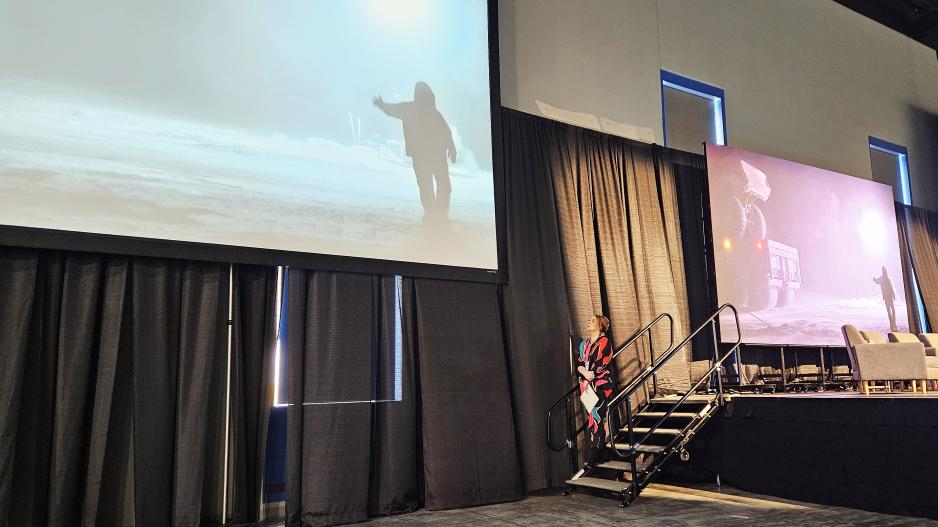Arne O. Holm says In this Giant Meeting Hall, Donald Trump is the Elephant in the Room

Rachael Kallander is the CEO of the Arctic Encounter conference in Anchorage, Alaska. (Photo: Arne O. Holm)
Anchorage, Alaska (High North News): I entered the year saying I would spend more time discussing with people who disagree with me. Therefore, what could be more natural than traveling to the Republican stronghold of Alaska?
If anywhere, this would be the place for answers on how a prosecuted narcissist could continue to rule America long after the voters have fired him as president.
Yet, after three days at the Arctic Encounter conference, meetings, and interviews, I am still seeking an explanation.
Conversations with both Republicans and Democrats (they actually exist in the American state where the Democrats have only won once since 1960) have given me no clear answers.
Even the Republican senator from Alaska, the experienced Lisa Murkowski, has declared that she refuses to vote for her own presidential candidate, Donald Trump, in the 2024 election.
More than 1000 participants
This year, the international Arctic Encounter conference celebrates ten years. With more than 1,000 participants, many of whom represent international organizations, defense, and the business sector, it is a shining example of how the world is moving northward.
An almost perverse game.
This year, that rings particularly true regarding the Nordic countries. Norway supplies Europe with energy, while Sweden and Finland have joined NATO.
Therefore, it is not surprising that Vice Admiral Douglas Perry, Commander of the Joint Force Command in Norfolk, USA, was the first to enter the stage. Just three weeks ago, he led 100 American paratroopers on a mission in Norway.
Seven hours after taking off from the military airport in Anchorage via the North Pole, they skydived into Inner Troms in Northern Norway.
I spent almost 30 hours on the same journey. An increasingly more brutal and blood-thirsty Russia, bordering both Norway and the US, is reducing the military travel time significantly.
The Vice Admiral justified the exercise, which bore the descriptive name "Arctic Shock," as necessary to to be able to defend independent European states and the future of Alaska and the US.

Downtown Anchorage, Alaska. The state making the US an Arctic nation. (Photo: Arne O. Holm)
War and climate
More than anywhere else in the world, the Arctic is a geographic region in which Russian aggression meets an accelerating climate crisis.
It is a region where people do their best to create good lives under sometimes extreme climate conditions, while the risk of an expanded war or accidental confrontations under the continuous military presence is very real.
Earlier this week, I participated in a meeting organized by Alaska World Affairs titled «As told from the North: A Journalist's Perspective on Russia, Ukraine & the Arctic.»
In an otherwise very talkative assembly, there was no trace of Republican enthusiasm for Donald Trump's almost perverse game with the fate of Ukraine.
At about the same time as the Admiral entered the stage during Arctic Encounter and celebrated the Ukrainian resistance together with the Finnish Ambassador Petteri Vuorimäk, Finnish defense attache Jua Helle, and Doug Jones from the Department of State, a whole other game took place in Washington.
Exalting the value of dialogue.
Possible and impossible
The speaker of the White House and Donald Trump employed all possible and impossible strategies to stop a necessary aid package of USD 60 million for Ukraine.
No one, absolutely no one, mentioned this in their speeches on stage. It was as if Trump did not exist as anything else than a nightmarish ghost with the ability to block any attempt to defend Western democracies against a Russian despot.
An elephant filled the whole of the gigantic meeting hall without being seen or mentioned.
That did not prevent the Arctic Encounter conference from exalting the value of dialogue across both borders and political colors.
Not a costly outpost
Russia's war against Ukraine and Finland and Sweden's accession to NATO have shifted the world's eyes to the Arctic. We are no longer a costly outpost to supply the rest of the world with food and energy. We are a living shield against an aggressor on behalf of seven Arctic states.
Use it to set demands.
Relatively speaking, we are few, but we are more important than ever.
And when the rest of the world now understands what we have known, at least since Russia's annexation of Crimea in 2014, it is up to us to set demands for the defense of democracy and freedom.
Therefore, the experiment of spending the year talking to people who disagree with me is feeling quite successful thus far.
Arctic Encounter illustrates that dialogue has not gone out of fashion.



